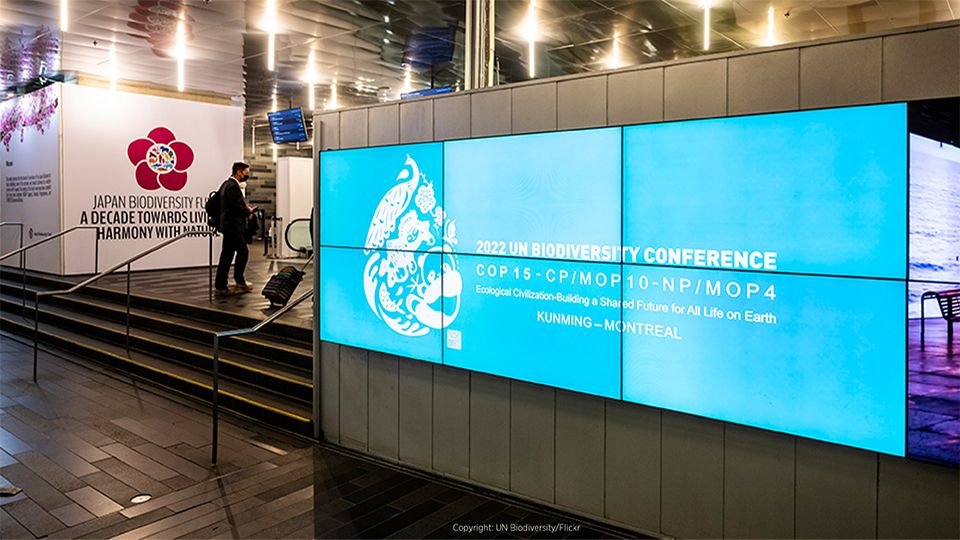When hearing “COP” conference, many think of the UN Climate COP. However, another Conference of the Parties that is making incredible strides is the “Biodiversity COP.”
The 2022 Conference of the Parties of the United Nations Convention on Biological Diversity (COP15) held in Montreal was attended by representatives from 188 governments around the world, ministers of finance, Indigenous people and local communities, academics, businesses and finance and youth. The goal was the adoption of a robust post-2020 Global Biodiversity Framework, which has been public and in the drafting process since July 2021. The framework with its four overarching global goals and 23 targets to be achieved by 2030 seeks to halt and reverse biodiversity loss.
Success was achieved! After two weeks of intense meetings and negotiations by nearly all stakeholders, the Kunming-Montreal Global Biodiversity Framework was adopted. We now have a shared vision to live in harmony with nature.
The framework is formal global acknowledgement of the importance of biodiversity and nature. Through its goals and targets, it aims to protect 30% of the world’s land, oceans, coastal areas and inland waters, reduce $500bn of harmful government subsidies and cut food waste in half by 2030. This matters because more than half of the world’s GDP is either moderately or highly reliant on nature and the services it provides, and there is mounting evidence of species and ecosystems decline.
I was energized to see the progress. The days were long, even while participants were jet lagged. Panels, whether at the crack of dawn or late into the evening, had standing-room-only crowds. There was a palpable feeling of dedication and commitment to move forward with the adoption of a robust, meaningful framework. The adage “desperation breeds innovation” comes to mind. Real ambition, deep engagement and exchange of ideas were the catalyst to success.
Takeaways
It was the first time I had attended the Biodiversity COP. As a sustainable investment manager, we have always valued transparency. Hence, I was fascinated by the open forum of the negotiations.
Environment and finance ministers from around the world gathered and painstakingly edited the proposed text, line by line. Hundreds of participants surrounded them, as if it were a music concert.
I was surprised to learn that COP 15 was the first to include a finance day, devoted to communication and commitment among government representatives, regulators, central banks, and public and private finance.
Finance is a powerful engine. Every dollar put into the world has impact, whether through purchasing or investing. Channeling financial flows for positive impact – and slowing negative flows – is imperative.
This convening allowed for sharing of progress already underway. But these voluntary actions alone are not enough to protect biodiversity. We need governments to incorporate nature into regulation and making biodiversity disclosure mandatory. The financial community’s support for the framework and encouragement for heads of state to push for agreement on the goals and targets was meaningful and influential.
Another notable development is the speed at which biodiversity has become part of the conversation in both the public and private sectors. At Domini, for several years, we have been working to integrate a systems-oriented approach to investment and risk control along with our portfolio-level policies and practices. Our goals of ecological sustainability and universal human dignity guide our focus on climate change and forests.
Going forward
In 2020, we signed the Finance for Biodiversity Pledge, a commitment to protect biodiversity through financing activity and investments. At that time, the pledge was signed by 25 other global financial institutions, representing $3trn in assets under management. Since then, it has grown to 126 signatories with over $20trn in assets among 21 countries. In addition, we’ve witnessed the recognition of the importance of biodiversity by corporations from a range of sectors – from pharmaceutical companies to insurance companies. The world seems to be at an inflection point of moving from assessing risk through a business lens to assessing risk based on its impact and dependency on nature.
With the framework in place, it is time for the work to begin, and in some cases, accelerate. The Taskforce on Nature-related Financial Disclosure (TNFD) was formed in 2020, launching in 2021 with widespread support of finance, corporations, governments and civil society. By November 2022, TNFD released its third version of its beta framework for comment. There is strong collaboration among various industry experts to advance disclosure and practices with nature impact.
Domini is one of the launching investor members of the Nature Action 100, a new global investor engagement initiative that soft-launched at COP15. Investors will engage companies in key sectors that are deemed to be systemically important to the goal of reversing nature and biodiversity loss by 2030, with the aim of driving greater corporate ambition and action on tackling nature loss and biodiversity decline. With this momentum building, let’s roll up our sleeves and get started. There isn’t a moment to spare.








